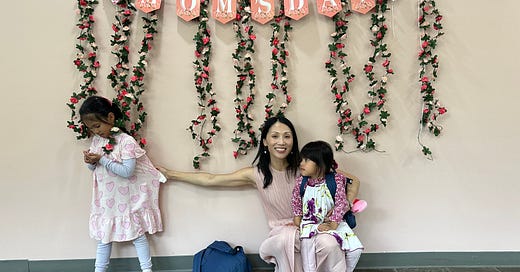When I realized I was taking on too much
As a woman who is the lead parent, consciously changing dynamics of intergenerational trauma, and speaking a minority language to her children
Dear readers,
A break from the lighthearted Korea trip to talk about something that I’ve been mulling over, and which finally coalesced in an aha! moment yesterday.
One. There is much discussion about the invisible load of parenting, which primarily falls on the lead parent, who is usually but not always, the mother. Lead parent is defined as “primary caregiver in a parenting partnership who takes on the main responsibility for managing the day-to-day needs of the child” (ChatGPT).
Two. There is also much discussion about intergenerational trauma, which encompasses biological, psychological, behavioral and social/cultural effects of trauma that are passed down to children and grandchildren. This can be at the macro-level, such as major 20th century upheavals affected the families of me and my podcast cohosts, like the Vietnam War (Susan), the Korean War (Jeanette) and the Cultural Revolution (me). This can be at the familial level, like the physical and emotional abuse the three of us received from our families of origin. First and second generation immigrants like us are trying to minimize the effects on our own children, through therapy and re-parenting ourselves in conscious ways.
Three. There is less but trending discussion about raising children who are bilingual and bicultural in the United States. There are families whose parents immigrated to the US for graduate school and are native speakers, like the parents of my oldest daughter’s best friend from school. There are families whose parents are both heritage speakers of the first or second generation (immigrated to US at young age or were born in the US with parents who are native speakers). And then there are families like mine, in which one parent (me) is a native speaker of the Sichuan dialect, and a speaker who acquired heritage Mandarin fluency in my youth from Chinese school.
Now imagine someone who is doing all of the above three concurrently and pretty successfully by outward standards. Is she superhuman? No, she’s just human and guess what, it turns out that she’s burned out.
That person, you may have guessed, is yours truly.
Sure, I’m very organized at running a household and managing every detail related to the kids’ schooling, social life, extracurriculars. Sure, I think I’m parenting my kids in a radically different way than my parents’ generation, while trying to retain the values I do identify with, like social consciousness, personal ethics, and hard work - all while working through my own childhood and young adult traumas of the sort that we talk about a lot on our podcast. Sure, my kids have native-level proficiency in Mandarin, speak to each other and dream in Mandarin and know who Jay Chou is 🤓.
Those are all incredible accomplishments, as my therapist would say. I try not to dwell on them because like a good Asian, one must always look ahead and think of greater accomplishments. So indulge me and let me dwell on them for a minute here.
What’s wrong with all that, you say? Nothing’s wrong with what I’ve done except that it’s all come at a cost to me. All it took yesterday to open the floodgates of reflection was our couples therapist asking me, “Kate, do you think you’re doing too much?” in the kindest way possible.
I cried. Because he, as middle aged white man, saw exactly how much I had taken on for my family, more than even my husband and my parents. I felt so validated. But I also cried because his question hit squarely home.
I know I am doing too much. I know it, I’ve known it, and I’ve tried to ignore it. Because that’s what we Asian immigrant women do. We work hard in silence without acknowledgement and we keep sacrificing ourselves for others. Why should we stick our necks out for credit? It seems too Western, too self-indulgent.
But aren’t I just perpetuating the same cycle of my mother, my grandmother, and my other female ancestors? How is what I am doing - even if it is in the name of breaking intergenerational trauma and passing on cultural traditions and ensuring my children a comfortable upbringing - a good thing for the state of women and for the very thing I am trying to overcome: intergenerational patterns of self-denial, self-abasement, self-denigration?
Let that sink in for you, if you do one or multiple of the above and feel like you’re floundering inside.
I’m not asking you to do anything or decide anything. Just acknowledge it and sit in it. That’s what I’m doing this week. No judgment, no action. Just sitting with this and feeling it for the first time in my life.
Mothers, fathers, immigrants, children of immigrants - I see you. Now it’s time to see yourselves.




